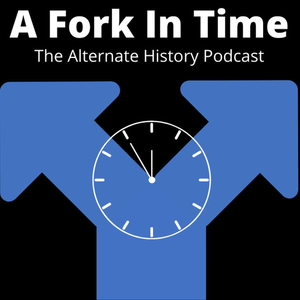
Radicals and Revolutionaries
09/28/10 • 28 min
This week the popular Radio 4 genealogy show presented by Sally Magnusson features listeners whose ancestors may have been involved in revolution or radical actions.
Trying to find records pertaining to revolutions is always tricky, since by their nature revolutions are fraught with chaos and upheaval. Files tend to be mislaid or destroyed, or too secret to have been placed in national archives. However, when an ancestor gets involved with revolution as well as high profile legal wrangling, there's a much better chance of striking gold. In this week's programme, Listener Anne Induni finds out the true story of her ancestor's arrest, for killing a politician in a 19th century Swiss revolution, and there are a whole lot more eye popping revelations about his activities.
When Judy Thompson wrote into the programme wanting to find out about her French ancestor's activities in the Paris Commune of 1871, she was hoping to track down more details from French archives, but found getting access and information baffling for a non gallic speaker. Author Gavin Dowd has been through the process and joins the team to dispense advice.
And another listener is keen to verify if she really is the great great great granddaughter of the assassin of a British 19th century Prime Minister. The first and only successful attempt in British history didn't quite spark a revolution, but has left a legacy in the modern House of Commons.
And regular studio guest Dr Nick Barratt is on hand to dispense advice and tips on how to trace revolutionaries in your family tree.
This week the popular Radio 4 genealogy show presented by Sally Magnusson features listeners whose ancestors may have been involved in revolution or radical actions.
Trying to find records pertaining to revolutions is always tricky, since by their nature revolutions are fraught with chaos and upheaval. Files tend to be mislaid or destroyed, or too secret to have been placed in national archives. However, when an ancestor gets involved with revolution as well as high profile legal wrangling, there's a much better chance of striking gold. In this week's programme, Listener Anne Induni finds out the true story of her ancestor's arrest, for killing a politician in a 19th century Swiss revolution, and there are a whole lot more eye popping revelations about his activities.
When Judy Thompson wrote into the programme wanting to find out about her French ancestor's activities in the Paris Commune of 1871, she was hoping to track down more details from French archives, but found getting access and information baffling for a non gallic speaker. Author Gavin Dowd has been through the process and joins the team to dispense advice.
And another listener is keen to verify if she really is the great great great granddaughter of the assassin of a British 19th century Prime Minister. The first and only successful attempt in British history didn't quite spark a revolution, but has left a legacy in the modern House of Commons.
And regular studio guest Dr Nick Barratt is on hand to dispense advice and tips on how to trace revolutionaries in your family tree.
Previous Episode

Tracing Rootless Ancestors
Tracing the roots of rootless ancestors might seem an impossible task, yet in this second programme of the series, Sally Magnusson and Nick Barratt attempt to do just that.
Mark Lorch is descended from a troupe of German Jewish acrobats, at one time the highest-paid circus act in the world. Mark wants to know more about their service in World War One and to fill in other gaps in his ancestors' lives. For a glimpse into the world of the circus and of the Lorch family, Sally visits the theatre archive of London's Victoria and Albert Museum.
Theresa Mitchell has asked for expert advice on how to explore her family's Romany heritage. Census records have told her that her family gave up their itinerant lifestyle at around the turn of the 20th century, but what happened next?
And Carol Hudson's mother came from a community who spent their summers in tents and their winters in caves in the west of Scotland. She never saw them again after leaving at the age of 14 to become a farm labourer, and World War Two brought her a marriage and a complete change of lifestyle. What, though, happened to the brothers and sisters she left behind? Nick has checked the archives and has the answers for Carol.
Next Episode

Caribbean Roots
October is Black History Month and this week Tracing Your Roots hears from listeners with family ties to the Caribbean. We follow Monica Brown, whose family come from Jamaica, as she makes an emotional trip to Zanzibar, visiting the underground chamber where slaves - including, she believes, her ancestors - were kept in horrific conditions before being sold. She wants to know more about her east African heritage.
Rosemarie Barnes also has slavery on her family tree, or so she thinks. Her great great great grandfather (who lived in Essex in the mid-nineteenth century) shares the name of a man who appears on the Jamaican slave register. Were they one and the same person? And if so, how did Edward Andrews get to England?
Soldiers from the Caribbean played their part in World War One, but how were they treated in comparison with their white counterparts? And were false promises made to them to induce them to head for Europe? Valerie Vaughan-Dick and Sheena Simpson ask what their ancestors did in the war, and what greeted them on their return home.
If you like this episode you’ll love
Episode Comments
Generate a badge
Get a badge for your website that links back to this episode
<a href="https://goodpods.com/podcasts/tracing-your-roots-518452/radicals-and-revolutionaries-67667570"> <img src="https://storage.googleapis.com/goodpods-images-bucket/badges/generic-badge-1.svg" alt="listen to radicals and revolutionaries on goodpods" style="width: 225px" /> </a>
Copy




